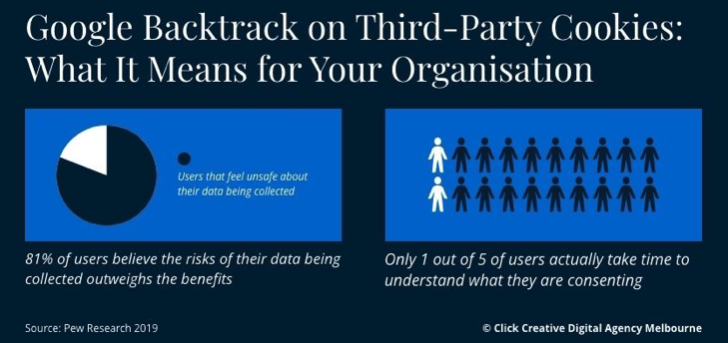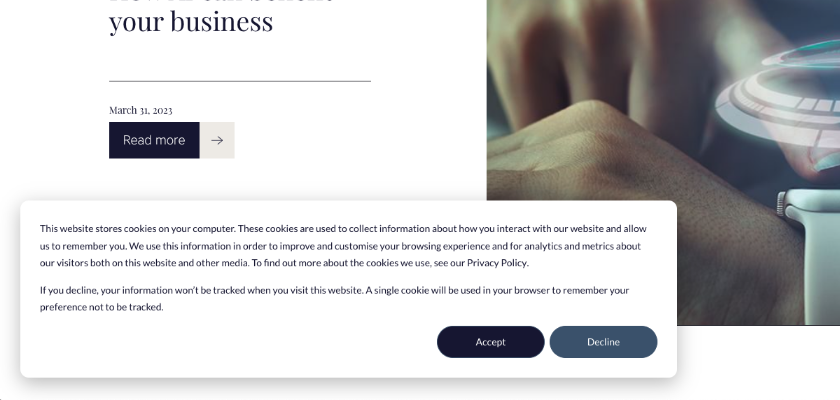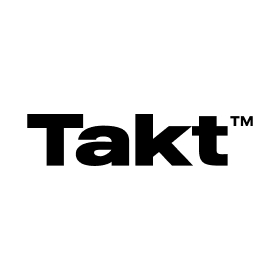
Google Delays Phasing Out Third-Party Cookies: What Does It Mean for Your Business?
Imagine you’re browsing a favourite news site, and suddenly you see ads for shoes you recently checked out on another website. It feels like the internet knows you, and in a way, it does—thanks to third-party cookies. These small data files track your activity across sites, helping advertisers deliver targeted ads. Despite all the talk about privacy and data protection, Google initially planned to phase these cookies out by 2022, then pushed it to 2025, and now they’ve decided to hold off even longer. This gives companies peace of mind that they are able to slowly crawl out of the conventional advertising strategy.
What Are Third-Party Cookies?

Third-party cookies are small crumbles of data stored on your browser by various websites. They keep track and share things like your browsing habits, preferences, and sometimes even personal information. For instance, if you see an ad for shoes while reading the news, it’s likely because third-party cookies are tracking what you’re up to across different sites. These cookies have been really on advertisers’ playbooks for a long time because they help personalised ads and understand how to get their point across to each customer better.
Why Did Google Change Its Plans?
Google’s Privacy Sandbox project has been working on new ways to replace third-party cookies with more privacy-friendly options. But they’ve faced challenges along the way. There have been a lot of discussions about privacy and how much companies should be allowed to track. Regulators and advocates, like the Information Commissioner’s Office (ICO), have been raising concerns about how much personal data is being collected. Plus, there are worries about whether Google’s new methods could end up being too controlling in the advertising space. Therefore, Google decided to back off from phasing-out of third-party cookies, which generate mixed reactions across the spectrum.
How Does This Affect Your Business?
Relying More on First-Party Data: As third-party cookies have been on constant fire, first-party data has become more reliable and a go-to than ever. This data, which comes solely from your own website, helps you understand your customers better and create more personalised experiences from other users’ experience exploring your site. For example, if someone frequently buys products in a certain category, you can tailor their shopping experience to show more of what they like.
Being Transparent and Building Trust: It’s really important to be open about what data you’re collecting and how you’re using it, especially with rules like the GDPR in place. When you’re upfront with your customers, it helps build trust. Given that most users are concerned about their data privacy, being clear about your data practices help you in keeping your customers around.
Improving the Overall Website Experience: Outside of just collecting data, it’s crucial to focus on making your website a pleasant place to visit. A smooth, efficient site not only keeps visitors around but also encourages them to come back. Whether it’s fast load times, easy navigation, or a clean design, all these elements contribute to a better user experience.
Keeping Up with Privacy Sandbox Updates: Although Google is backing off from blocking third-party cookies, it has never been a guarantee that Third Party Cookies will stay for a long time. Google is still working on new tools through the Privacy Sandbox project and staying up-to-date with their findings are crucial. These updates will help you understand the new landscape of online advertising and make sure your business stays compliant with the latest standards.
Making Sense of Cookie Consent

Adding cookie consent popup is one thing but making sure it can be understood in a quick glance is another. With only few people actually taking the time to understand what they are consenting for, this creates a ‘privacy paradox’ for the rest which explains how people’s concern is condescending with their behaviour. Therefore, one key area businesses need to work on is having clear cookie consent options. For example, on our website, we’ve made sure to have a simple and easy-to-understand cookie consent pop-up that people could understand. This feature helps visitors see exactly how their data will be used in the most concise fashion, showing that we respect their privacy and want to be transparent.
Besides cookie consent, it’s also worth looking at other ways to respect user privacy, like focusing more on first-party data. Although the appeal of having broader data of people outside of your website has been the winning value proposition of third-party cookies over first-party cookies, sticking with first party cookies means you’re not only complying with regulations but also creating a positive experience for your visitors from the experience of others that have had direct experience going through your website.
Final Thoughts
As privacy becomes as important as personalised messaging for customers, businesses need to be flexible and ready to adapt. Even though third-party cookies are still around for now, it’s clear that we will emphasise more transparency and respect for user control. Staying updated with the latest developments and being proactive in adopting new practices will be key. As a digital agency, we’re here to navigate these changes, ensuring that your digital strategies align with the evolving standards while maintaining a strong connection with your audience.
About Click Creative
The team of Click Creative is a group of like-minded people dedicated to producing creative, effective digital solutions for our clients. Specialising in custom, bespoke websites, applications, and digital marketing solutions. We bring years of experience, yet bright new ideas to the table every day – we love programming, keywords and coffee!























